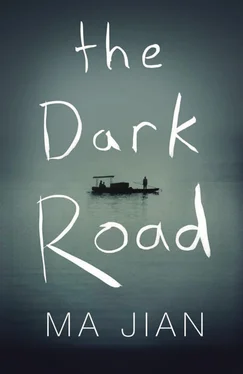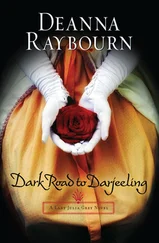‘Stop worrying,’ Kongzi says. ‘I told you, the head of the County Family Planning Commission is a reasonable man. We wouldn’t be allowed to stay on this island otherwise. You go into town, and take Nannan with you.’ Kongzi picks up lots of local information from other scavengers on the rubbish dump. Last week, he was told that a professor from Guangxi University was giving a lecture on Neo-Confucianism and Modernity at the County Cultural Palace, which he made a special effort to attend.
‘No, I won’t take Nannan,’ Meili says, stepping onto Xixi and Chen’s boat. ‘There might be child snatchers in the crowd.’
‘But those gangs only snatch boys,’ Kongzi says.
‘I don’t care. You look after her.’
Once the boat pulls away, Kongzi wades into the river and feeds yesterday’s leftover noodles to the chickens in the cage.
Up in the centre of town, after walking past the covered market and newly built Eastern Sauna House, Meili sees a large crowd staring up at a construction worker who’s threatening to jump from the top of a half-finished office block. When he waves his hands about he reminds her of an old school friend who now works for the governor of Nuwa County. Anxious to escape the crowd, she skirts its perimeter and enters a wide, empty street. In the clear morning light, the family planning banners strung overhead appear even larger. One side of the street has been recently covered with cement; the other side remains potted with holes. She walks on, following smells of dough sticks and fried dumplings which lead her to a small food stall outside a restaurant with blue-glass windows.
Meili buys three dough sticks. Unable to resist, she opens the newspaper wrapping straight away and bites into one. Delicious. She sits on the restaurant’s concrete step and reads the slogan daubed on the opposite wall: ANY PERSON FOUND TO HAVE EVADED MANDATORY STERILISATION WILL BE ARRESTED AND FINED. For the first time since the abortion, she is able to read this familiar slogan without her stomach knotting with fear.
She studies the blank expressions of the people passing by on their way to work, and feels frustrated. She too would like to stroll to work every day wearing a smart dress, shiny leather shoes, holding a handbag containing a hairbrush and make-up. But peasants are banned from entering tall office buildings which are warmed in winter and cooled in summer, and where staff are paid high salaries for sitting at their desks all day. Although Meili was born into a peasant family, she longs to live like the rich women in television dramas who own air-conditioned flats and air-conditioned cars and never have to set foot in a field. Once she has joined their ranks, she too will dress herself in a tailored suit, paint her nails red, fasten elegant sandals to her feet and stride into an air-conditioned jet or the carpeted foyer of a luxury hotel. She may be inadequately educated, but she has confidence and determination. She is able, after all, to perform a song in public having heard it only twice. She still dreams of becoming a pop star, and of travelling the country singing ballads in satin ball gowns. Before she married, she and six friends from Nuwa Village formed a group called the Nuwa International Arts Troupe, and toured local coal mines and rural markets, performing pop songs and belly dances. But she quit after a week when the manager of one village hall told her that unless the girls danced naked on the stage, no one would pay money for tickets. She’s always believed that women should be respectable and modest. Since marrying Kongzi, she has dedicated herself to their family and endured their poverty without complaint. But she feels now that the time has come to pull herself together, find a job and start earning some money. Even if they never manage to live in a city, she must at least make sure that they can build themselves a new house back in Kong Village equipped with all the latest electronic appliances.
She walks back past the five-storey block from which the construction worker is still threatening to jump. The crowd has swollen. A man who’s set up a makeshift stall shouts through a megaphone: ‘For the best viewing experience, buy one of my telescopes and folding stools!’ People impatient to get to work cry out: ‘Hurry up and jump, will you? We can’t wait around all day.’ Without glancing up, Meili pushes her way through the crowd, managing to reach the covered market with the two remaining dough sticks intact. The smell of scorched poultry in the air is familiar to her. Since she got married, she has always been the one to slaughter the chickens, pluck them, then scorch the soft down from their skin. Glancing around at the busy stalls of the market, she thinks to herself, perhaps I could set up business here too. At least it’s sheltered from the elements.
She turns to a stallholder and asks, ‘How much are the ducks today, sister?’
‘Three yuan a jin, and an extra yuan if you want it killed, plucked and gutted.’
‘I can pluck. Are you looking for assistants?’ Meili’s already contemplating selling their flock of ducks to raise money to rent a space and buy stock.
‘No, that guy over there is, though,’ the stallholder replies, raising her eyebrows in the direction of a tall skinny man who’s standing beside a fish stall.
Meili approaches him and asks for a job. He fixes his large, protruding eyes on her and says: ‘I need someone who can gut and scale. I pay one jiao a fish. If you want to see how it’s done, sit here and watch.’
Meili pulls over a wooden crate, sits down on it, and sees on the wall opposite her a notice that says: MILK POWDER WARNING ISSUED BY THE MUNICIPAL HYGIENE DEPARTMENT. TO SAFEGUARD INFANT HEALTH AND PREVENT DAMAGE TO THE WIDER POPULATION, A BAN HAS BEEN PLACED ON INFERIOR-QUALITY MILK POWDER… She remembers Kongzi mentioning that he delivered a cargo of counterfeit milk powder to some businessman who’d bought them wholesale for three yuan a bag and was planning to sell them on the streets at triple the price. At the time, she reasoned with herself that whether the powder was fake or genuine, it would at least provide more nourishment than the rice gruel most peasant women feed their babies. Infant formula is always in demand. She is sure that if she opened a stall selling baby products in this market she could make a good profit.
After watching the fishmonger gut and scale for several hours, Meili realises that Kongzi must be hungry for the dough stick and is probably wondering what has taken her so long. She goes out into the sunlight and runs downhill. The June sun is scorching the dust on the pavement and the clumps of withered weeds growing along the kerbs. A hot wind chases her all the way to the river. She wades into the water, panting for breath, and scans the distant sand island, but sees no sign of Kongzi or their boat. Then, turning to her right, she spots their boat emerge from a huddle of rafts tethered to the jetty. The rooster stretches its head out of the cage and stares at her. Wiping the sweat from her face, she waves to Kongzi who’s standing behind the wheel wearing a vest and shorts and muddy flip-flops.
He helps her onto the boat with the bamboo pole, frowning disgruntledly. ‘What took you so long?’ he barks.
Nannan’s dress is sopping wet. She sticks her leg out, points her bare toes and says, ‘Dad said I can’t dance, Mummy!’
‘I was in the market, learning how to gut fish,’ Meili tells Kongzi. Sensing his disapproval of her independent attitude, she quickly changes the subject. ‘So, did that man jump in the end?’
‘I thought that’s what you went to see. No, no. He didn’t jump. The police dragged him away an hour ago. I withdrew a hundred yuan from the bank. There was no problem. It’s not connected to our branch in Hubei Province. We still have a thousand yuan left in our account.’
Читать дальше












